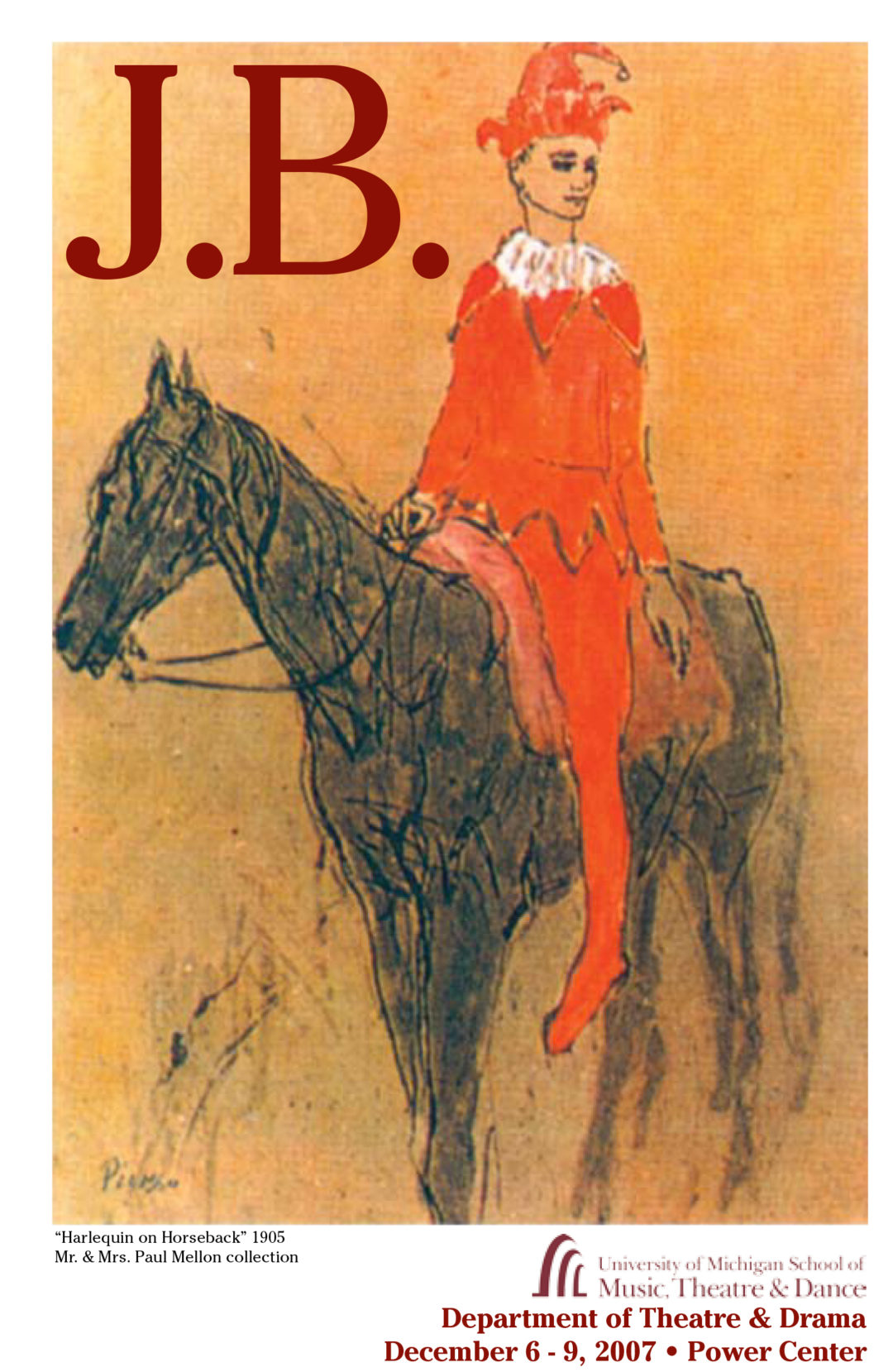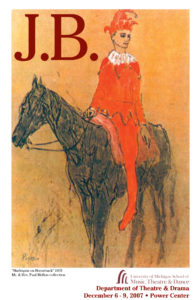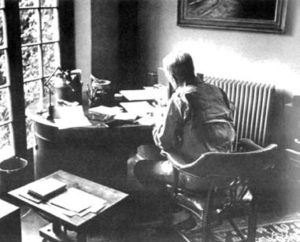J.B.
By Archibald MacLeish
Department of Theatre & Drama
December 6-9, 2007 • Power Center
The Story: J.B. is an exalting morality play based on the biblical story of Job. Two members of a traveling circus, Mr. Zuss and Nickles, take up the roles of God and the Devil respectively to test the faith of man. Nickles insists that inordinate suffering must surely cause one to doubt the existence of a benevolent God, thus begins the play within the play. J.B. and his wife Sarah lead a serene and comfortable life with their five children. As Zuss and Nickles begin their manipulations, J.B. loses his family, wealth, and health in rapid succession. Faced with the spiritual inquiry of why humans must suffer, will J.B.’s suffering cause a crisis of faith?
Artistic Significance: Distinguished poet Archibald MacLeish’s play J.B. debuted on Broadway in 1958 and beat out A Raisin in the Sun, A Touch of the Poet, and Sweet Bird of Youth for the Pulitzer Prize. MacLeish (1892-1982) is best remembered for his poems “Conquistador,” “Ars Poetica,” and “Riders on the Earth.” Written in verse, the play is an affirmation of what MacLeish called “the fundamental human belief in life in spite of life. The Book of Job is a human triumph – Job’s willingness to pick up and go on. In that way, the myth of Job is a myth for our time because this is our answer also.” J.B. earned MacLeish his third Pulitzer Prize and a Tony Award. Brooks Atkinson of the New York Times declared the play to be “one of the most memorable works of the century.” With today’s unrelenting torrent of terrible news, J.B. is a testament to the power of love and the undying persistence of the human spirit.
Artistic Staff
Director: Philip Kerr
Assistant Director: Sarah-Jane Gwillim
Scenic Design: Vincent Mountain
Costume Design: Jessica Hahn
Lighting Design: Rob Murphy
Sound Design: Henry Reynolds
Stage Manager: Stephanie Shechter
Cast
Monsieur Sept, ringmaster: Chad Henne
Hector, a strongman: Jake Long
Otto, a clown: Nick Lang
Lou, a clown: Brian Holden
Zoom, the cannon act: Will Johnson
Rabel, an acrobat: Jamar Adams
Tanzi, an acrobat: Bridget Gabbe
Lum, a tumbler: Nico Ager
Tum, Bardi Troupe: Quinn Murphy
Zing, Bardi Troupe: Emma Murphy
Ping, Bardi Troupe: Claire Murphy
Arc, a vendor/Bildad: Louis Marino
Eddie, a manager/Zophar: Jonathan Christopher
Brownie, a trainer/Eliphaz: Lee Chrisman
Kress, wardrobe/Mrs. Lesure: Jessica Maynard
Zoe, wardrobe/Mrs. Murphy: Kelli Rasmus
Hanki, wardrobe/Mrs. Botticelli: Julia Albain
Ella, wardrobe/Mrs. Adams: Alana Zonan
Didi, a trainer/Miss Maple: Katie Johnston
Shell, a trapeze artist/Girl: Lauren Lopez
Crush, a trapeze artist/Jolly: Kaylin Tavolacci
Zuss, a vendor/Godmask: J. Patrick Rourke
Nickles, a vendor/Satanmask: Alex Polcyn
J.B., a businessman: Dylan Saunders
Sarah, his wife: Sara Greenfield
David, his son: Nico Ager
Mary, his daughter: Bridget Gabbe
Jonathan, his son: Quinn Murphy
Ruth, his daughter: Emma Murphy
Rebecca, his daughter: Claire Murphy
Sponsors
The School of Music, Theatre & Dance acknowledges the generosity of McKinley Associates, Inc. whose support has helped make this production possible.
Resources
[accordion title=”Foreword by the Author”]
A man may be forgiven for dramatizing an incident from the Bible and even for modernizing it in the process. But what I have done is not so easy to excuse. I have constructed a modern play inside the ancient majesty of the Book of Job much as the Bedouins, thirty years ago, used to build within the towering ruins of Palmyra their shacks of gasoline tins roofed with fallen stones.
The Bedouins had the justification of necessity and I can think of nothing better for myself. When you are dealing with questions too large for you which, nevertheless, will not leave you alone, you are obligated to house them somewhere – and an old wall helps. Which is perhaps why so many modern plays have proved, on critical examination, to be reconstructions of the myths of Greece. That appeal to precedent, however, is of little use to me for my J.B. is not a reconstruction of the Book of Job – not, at least, a reconstruction of the kind presently familiar in which the discovery of the model is part of the adventure. My play is put in motion by two broken-down actors who believe, themselves, that the play is the Book of Job and that one of them is acting God and the other, Satan. When J.B. and his family appear however it is not out of the Bible that they come.
But justification is still necessary and necessity is still the only justification I can plead. I badly needed an ancient structure in which to build the contemporary play which has haunted me for five years past and the structure of the poem of Job is the only one I know into which our modern history will fit. Job’s search, like ours, was for the meaning of his afflictions – the loss of his children, the loss of everything he possessed, the loss of his wife’s kindness, who turned upon him in his agony with those ineradicable words, surely the most dreadful ever spoken by wife to husband: “Curse God and die!” There was no reason for all this: no reason the mind, at least, could grasp. Job was, by witness of God himself, and twice repeated “a perfect and an upright man” and his destruction was, by the same unquestionable authority, “without cause.” As for ourselves, there can be very few of us who are perfect, but the enormous, nameless disasters which have befallen whole cities, entire peoples, in two great wars and many small ones, have destroyed the innocent together with the guilty – and with no “cause” our minds can grasp.
We attribute these sufferings, except when it is we ourselves who have inflicted them, to the malevolence of our enemies, but even so we are appalled by all this anguish. Hiroshima, in its terrible retrospect, appalls us. And we attempt – millions of us, the psychiatrists say to justify the inexplicable misery of the world by taking the guilt upon ourselves as Job attempted to take it: “Show me my guilt, O God.” We even listen, as Job did, to the Comforters – though our Comforters are not like his. Where Job’s Comforters undertook to persuade him, against the evidence of his own inner conviction, that he was guilty, ours attempt to persuade us that we are not – that we cannot be – that, for psychological reasons, or because everything is determined in advance by economic necessity anyway, or because we were damned before we started, guilt is impossible. Our Comforters are, if anything, less comfortable than Job’s for they drive us from the last refuge in which our minds can hide from the enormous silence. If we cannot even be guilty then there are no reasons.
There are those, I know – because I have heard them – who will object that Job’s story bears no true relationship to our own because God has changed in the interval. The God of Job is God the Creator of the Universe and science, they say, now knows that there is no such Creator – that the events of time progress by an automatism of their own – that the watch winds itself up and ticks by its own jiggling. The modern God of the scientific age, that is to say, does not control events: not, at least, events in the world of here and now.
I have no wish, and certainly no competence, to argue the questions of faith, which underlie that attitude. But two things may be said from the merely human position. The first relates to the statement that science knows now there is no Creator. Does it? Einstein has told us that he had sometimes the sense that he was following in his plumbings and probings of the universe, the track of an Intelligence far beyond the reaches of his own. The second thing to be said is this: that there has been nothing in human history, which has brought mankind closer to the immanence of an infinite creativity than the revelation that the minutest particles of inert matter contain an almost immeasurable power. To me, a man committed to no creed, and more uncertain than I should be of certain ultimate beliefs, the God of Job seems closer to this generation than he has to any other in centuries.
— Archibald MacLeish, reprinted from the New York Times, December 7, 1958
[/accordion]
Media
Program
Photos
[cycloneslider id=”07-08-j-b”]



